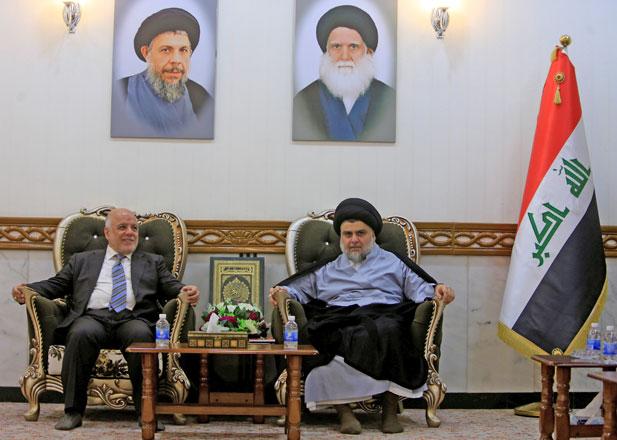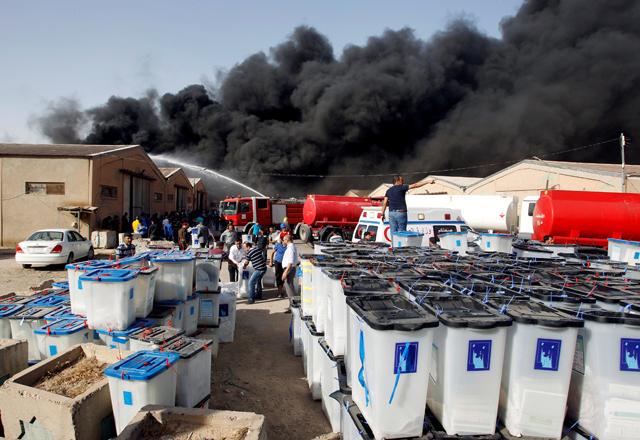You are here
PM Abadi, Sadr alliance brings Iraq gov’t closer
By Reuters - Jun 24,2018 - Last updated at Jun 24,2018

Iraqi Prime Minister Haider Al Abadi, who’s political bloc came third in a May parliamentary election, (left) meets with cleric Moqtada Al Sadr, who’s bloc came first in Najaf, Iraq, on Saturday (REUTERS photo)
NAJAF/BAGHDAD — Prime Minister Haider Al Abadi and cleric Moqtada Al Sadr said their political blocs would enter into an alliance, bringing Iraq one step closer to forming a new government after an election marred by low turnout and fraud allegations, Reuters reported late on Saturday.
The alliance between Abadi’s Victory Alliance, which came third in a May parliamentary election, and Sadr’s Saeroon list, which won the largest number of seats, increases the chances of forming a government after weeks of political tensions.
“We announce a cross-sectarian, cross-ethnic alliance to speed up forming the next government and to agree on common points that guarantee the interests of the Iraqi people,” Sadr said at a news conference in the Shiite holy city of Najaf.
He called for a wider alliance consisting of all components of Iraqi society that would form an inclusive government.
Sadr presents himself as a non-sectarian nationalist opposed to both the United States and Iran’s influence over his country. Saeroon is an electoral alliance between Sadrist politicians, the Iraqi Communist Party and other secular candidates.
Yet earlier in June Sadr went into an alliance with Hadi Al Amiri, a Shiite militia commander with close ties to Iran whose Fatih coalition came second in the election.
There was no immediate reaction from al Amiri’s camp, but the prime minister said his pact with Sadr would not compromise the cleric’s other alliance.
“I affirm that this alliance is not in contrast to any other alliances either of the two lists have previously entered into with other blocs, rather, it flows in the same direction and same principles,” said Abadi.
The top three winning blocs, all Shiite-led, have upwards of 140 seats between them. At least 165 seats are needed to form a government although traditionally the ruling bloc in parliament tends to be larger so as to include Sunni Arab and Kurdish lawmakers.
A coalition between Sadr, Amiri, and Abadi could see internal divisions. Abadi had balanced US and Iranian interests during his term and was backed by the West. Sadr says he opposes both, and Amiri is Iran’s biggest Iraqi ally.
Despite coming in third, Abadi is hoping to win a second term as a compromise candidate for the premiership. Analysts and diplomats say he would be weakened and beholden to Sadr and Amiri even if he manages to stay on, however.
Abadi and Sadr both called on the leaders of other blocs to meet and “agree on the coming steps” in order to speed up the formation of an inclusive Iraqi government.
Political leaders in Iraq traditionally hold such meetings after elections as part of the lengthy and often complicated process of forming a coalition government, as no one party ever wins enough seats to form a government on its own.
The process is further complicated this time round because the next parliament is born of an election marred by historically low turnout and allegations of fraud.
Iraq will conduct a manual recount votes from a May parliamentary election only for those ballots mentioned in official reports on fraud or formal complaints, a judicial panel tasked with running the elections commission said on Sunday.
Ballot boxes from areas where there were fraud allegations will be moved to the capital Baghdad, where the recount will be held with the attendance of United Nations representatives at a time and place to be determined later, the panel said in a statement.
A fire at a storage site housing half of Baghdad’s ballot boxes had raised tensions. Security forces said it was deliberate and made arrests but said most ballots were saved. No party has been identified as responsible yet.
The recount will slow down the process as the new parliament and government cannot be formed until the results are officially ratified by Iraq’s Supreme Federal Court.
Political leaders need to meet soon in order to end that “crisis” and speed up the process, Abadi said.
Related Articles
BAGHDAD — Nationalist cleric Moqtada Al Sadr and Iranian-backed militia chief Hadi Al Amiri, who won first and second place respectively in
KIRKUK, Iraq — One person was killed in Iraq’s Kirkuk on Sunday when a suicide car bomb went off near a storage site housing ballot boxes fr
BAGHDAD — Shiite cleric Moqtada Al Sadr urged Iraqis on Monday to unite rather than squabble over a possible rerun of the election his bloc

















